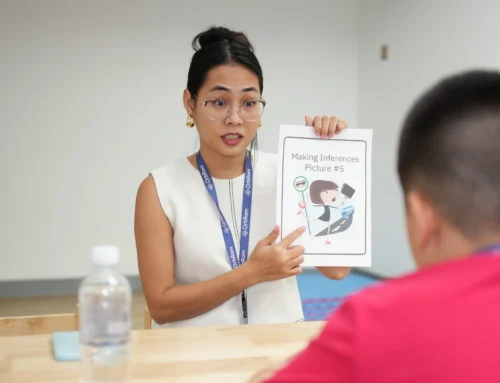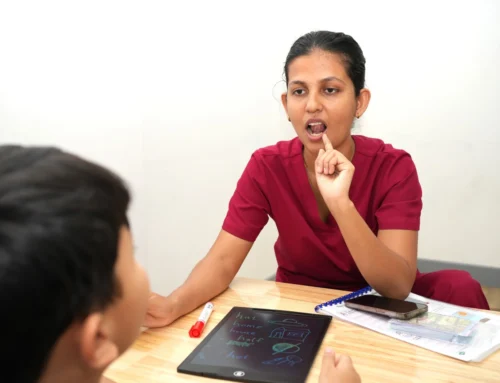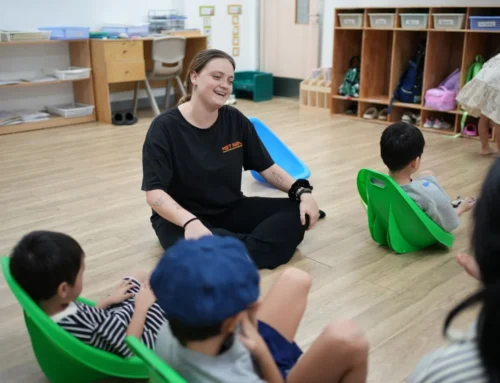Language and literacy are deeply intertwined. In classrooms across Phnom Penh and beyond, teachers often notice that children who struggle with speech and language also face challenges when learning to read and write. Speech therapy plays a vital role in bridging this gap, helping children build the strong language foundation needed for literacy success.
In Cambodia, where multilingualism and diverse educational backgrounds are common, understanding the connection between speech therapy and literacy development can make a life-changing difference for students’ learning outcomes.
Understanding the Link Between Speech and Literacy
Speech therapy is not just about helping children pronounce words clearly — it’s about strengthening the underlying language skills that support reading and writing. Literacy development depends heavily on a child’s ability to understand and use language.
Children must recognize sounds (phonology), understand word meanings (semantics), form sentences (syntax), and use language for communication (pragmatics). When these skills are delayed or disordered, literacy can be significantly affected.
Speech-language pathologists (SLPs) at centers such as OrbRom Center focus on developing these essential building blocks. Through individualized sessions, they help children improve their listening, speaking, and comprehension skills — all of which directly influence their reading and writing abilities.
How Speech Therapy Builds Pre-Literacy Skills
Before children can read or write, they must first develop pre-literacy or emergent literacy skills. Speech therapy supports this early stage in several ways:
1. Phonological Awareness
Phonological awareness is the ability to identify and manipulate sounds in spoken words — such as rhyming, segmenting, and blending sounds. These skills form the foundation of decoding, which is essential for reading.
A speech therapist may use fun, play-based activities such as clapping syllables, matching rhyming words, or identifying beginning sounds. For example, when a child can recognize that bat and ball start with the same sound, they are strengthening their sound awareness — a key step toward literacy.
2. Vocabulary Growth
Children with limited vocabulary often find it harder to understand what they read. Speech therapy helps expand vocabulary through targeted language activities and real-world examples.
At OrbRom Center’s Preschool Program, therapists and teachers work together to expose children to rich language experiences — reading picture books, describing objects, and discussing daily events — so that they can better connect spoken and written words.
3. Sentence Structure and Grammar
Grammar and syntax are critical for both writing and reading comprehension. A child who has difficulty forming correct sentences orally may also struggle to construct sentences in writing.
Speech therapy sessions often include storytelling and sequencing tasks that build sentence complexity, teaching children how to express ideas clearly and logically — both in speech and in writing.
Speech Therapy and Reading Skills
1. Decoding and Phonics
Reading requires recognizing letters and connecting them to their corresponding sounds. For children with speech sound disorders, this process can be confusing.
A speech therapist can help a child distinguish between similar sounds, such as /b/ and /p/, or /s/ and /sh/. This improves their ability to decode written words accurately, leading to smoother reading fluency.
2. Reading Comprehension
Comprehension goes beyond recognizing words — it involves understanding meaning. Speech therapy supports comprehension by strengthening vocabulary, sentence construction, and inferencing skills.
For example, a therapist might read a short story with a student and ask comprehension questions, prompting them to think about what happened, why it happened, and what might happen next. This approach builds critical thinking and narrative understanding, two essential elements of strong literacy development.
3. Fluency and Expression
Children with speech difficulties may read in a monotone voice or with incorrect intonation, making reading less expressive and engaging. Speech therapists help children practice prosody — the rhythm, stress, and intonation of speech — to improve oral reading fluency.
Speech Therapy and Writing Development
Speech therapy doesn’t just help children say words better — it helps them think and organize ideas more clearly. Writing requires planning, vocabulary retrieval, and sentence structure — all skills developed through language therapy.
1. Organizing Ideas
A child who struggles to express thoughts verbally will likely face challenges when putting ideas on paper. Through speech therapy, children practice describing, sequencing events, and explaining their reasoning, which translates directly into improved writing organization.
2. Using Correct Grammar and Syntax
Speech therapists teach the correct use of tenses, plurals, and sentence connectors (like “because,” “although,” or “therefore”). When children master these orally, they are more likely to use them correctly in writing assignments at school.
3. Spelling and Word Recognition
Speech therapy activities that target sound-letter awareness also enhance spelling skills. By helping children hear and distinguish individual sounds in words, therapists make spelling more logical and predictable — a particularly valuable skill for young learners in Phnom Penh classrooms where English is often a second or third language.
The Role of Speech Therapists in Cambodian Schools
In international and local schools across Cambodia, teachers are increasingly aware of how communication difficulties can affect academic achievement. However, not all educators are trained to identify or address speech and language challenges.
Speech-language pathologists play an essential role in bridging this gap. They collaborate with teachers to assess students’ needs, design classroom-friendly strategies, and support literacy instruction.
For instance, a speech therapist might:
-
Recommend reading materials aligned with a child’s language level.
-
Provide classroom cues to support phonemic awareness.
-
Conduct small group sessions to practice listening and retelling stories.
-
Train teachers on how to reinforce speech goals during literacy lessons.
This multidisciplinary approach ensures that children receive consistent support both in therapy and in the classroom environment.
Supporting Literacy at Home: What Parents Can Do
Parents are powerful partners in supporting their child’s literacy development. Here are some ways they can help at home:
-
Read aloud daily. Choose age-appropriate picture books and discuss the story.
-
Talk often. Everyday conversations build vocabulary and comprehension naturally.
-
Encourage storytelling. Ask your child to describe what happened at school or retell a story in their own words.
-
Play sound games. Try rhyming challenges or identify the first sound in a word.
-
Seek professional support early. If you notice difficulties with pronunciation, vocabulary, or understanding, consult a speech-language pathologist.
Centers like OrbRom Center in Phnom Penh offer specialized speech therapy programs and assessments to identify each child’s unique strengths and needs.
Early Intervention Makes a Lifelong Difference
Research consistently shows that early speech and language support leads to stronger literacy outcomes. The earlier children receive intervention, the easier it becomes for them to catch up with peers and gain confidence in learning.
In Cambodia, where access to specialized services is expanding, parents and educators now have greater opportunities to support children’s speech, language, and literacy needs. Programs like OrbRom’s Special Needs Intensive Intervention provide one-on-one sessions focused on both communication and academic readiness — ensuring that every child has the chance to thrive.
Conclusion: Empowering Cambodia’s Future Readers and Communicators
The connection between speech therapy and literacy development is undeniable. By nurturing a child’s ability to understand, use, and play with language, speech therapy paves the way for stronger reading and writing skills.
As Cambodia continues to emphasize inclusive and quality education, integrating speech therapy into early education programs is key to unlocking children’s potential. Through collaboration among speech therapists, teachers, and families, every child — regardless of background or ability — can become a confident communicator and lifelong learner.
For families in Phnom Penh seeking guidance, OrbRom Center offers evidence-based, individualized speech therapy to strengthen communication and literacy foundations.
We are the only Preschool specialized on children with special needs in PhnomPenh.
- Internationally qualified teachers
- Cambodia’s largest sensory room
- Outdoor swimming pool
- Covered outdoor playground
📞 Phone: 077.455.993
Telegram Link: https://t.me/OrbRom





